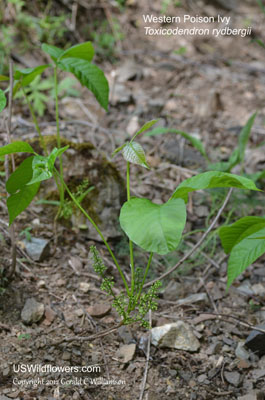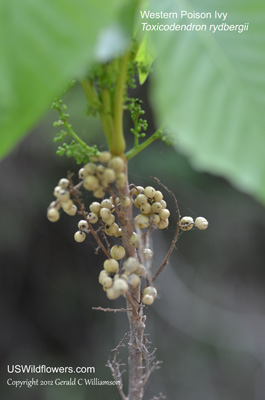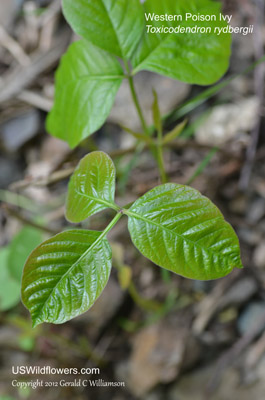Western Poison Ivy, Northern Poison Ivy - Toxicodendron rydbergii
|
Toxicodendron rydbergii - Western Poison Ivy, Northern Poison Ivy. The genus Toxicodendron has 5 species native to the United States- two poison oaks, two poison ivys, and poison sumac. All produce oils which are a significant skin irritant to most people. The oil seems to be harmful only to humans, but animals who have come into contact with the plant may carry the oil to their human companions - watch out where your dog has been rolling.
While it is usually called Western Poison Ivy, it grows throughout southern Canada and the lower 48 United States, except in California and several southeastern states. In the eastern parts of the country it may be known by the common name Northern Poison Ivy.
It is classified as Endangered in Ohio.
Found in:
AZ, CO, CT, IA, ID, IL, IN, KS, MA, MD, ME, MI, MN, MT, NC, ND, NE, NH, NM, NV, NY, OH, OK, OR, PA, RI, SD, TX, UT, VA, VT, WA, WI, WV, WY
Leave comments on Toxicodendron rydbergii at this link. | 
Distribution of Toxicodendron rydbergii in the United States and Canada:

Blue=Native; Grey=Introduced
Map from USDA Plants Database:
USDA, NRCS. 2017. The PLANTS Database (http://plants.usda.gov, 08 May 2025). National Plant Data Team, Greensboro, NC 27401-4901 USA.
Search Our Database: Enter any portion of the Scientific, Common Name, or both.
Do a general Google search of the entire site:
#ad
 Follow USWildflowers on Twitter
| | Site: Kleinschmidt Grade, Adams County, ID Date: 2012-May-25 | Photographer: Gerald C. Williamson
Nikon D7000
| | Western Poison Ivy blooms from late spring through early summer, and in some parts of the country may bloom a second time in late summer. The flowers are quite small and if you get close enough to enjoy them you risk contact and the adverse consequences. | | 
| | Site: Kleinschmidt Grade, Adams County, ID Date: 2012-May-25 | Photographer: Gerald C Williamson
Nikon D7000 | | Western Poison Ivy is a normally a woody-stemmed shrub that may grow up to about 4 feet tall. While it may also sometimes show up as a vine, unlike Toxicodendron radicans (Eastern Poison Ivy) it does not climb extensively.
| | Click on the photo for a larger image

| | Site: Kleinschmidt Grade, Adams County, ID Date: 2012-May-25 | Photographer: Gerald C Williamson
Nikon D7000 | | The fruit of Toxicodendron rydbergii are eaten by some birds. Animals do not appear to have ill effect from the urushiol - the oil that causes allergic reaction in most humans. Urushiol is present in all plant parts, and is the same oil in all Toxicodendron species.
| | Click on the photo for a larger image

| | Site: Kleinschmidt Grade, Adams County, ID Date: 2012-May-25 | Photographer: Gerald C Williamson
Nikon D7000 | | The young leaves of Western Poison Ivy have a waxy appearance. While other plants also have three-part leaves, the "leaves of three, let it be" saying is worth teaching to your children.
| | Click on the photo for a larger image

|
References used for identification and information:
|
|
| |
| #ad
|
|






